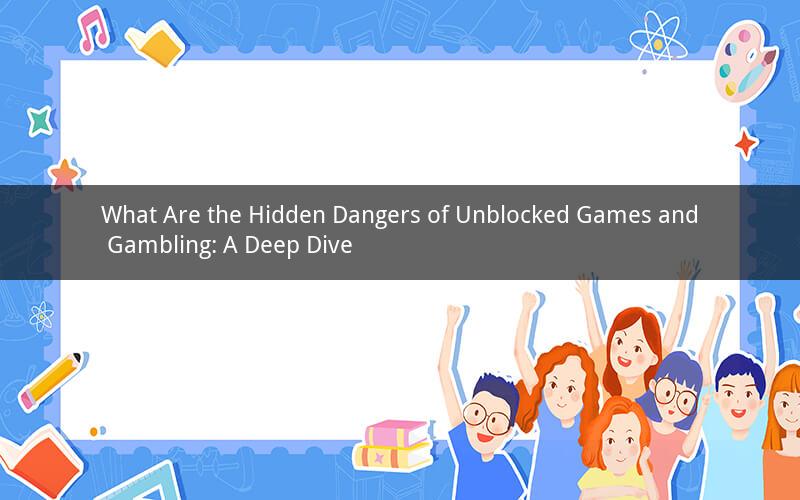
Table of Contents
1. Introduction to Unblocked Games
2. The Rise of Unblocked Games in Educational Settings
3. The Connection Between Unblocked Games and Gambling
4. The Psychological Impact of Unblocked Games and Gambling
5. The Legal and Ethical Implications
6. Case Studies: Real-Life Consequences
7. Parental and Teacher Perspectives
8. The Role of Technology in Combating Unblocked Games and Gambling
9. Conclusion
---
1. Introduction to Unblocked Games
Have you ever wondered what lies behind the allure of unblocked games? These games, often found on educational websites, are designed to entertain and engage students during breaks or as a reward for good behavior. However, the question arises: what happens when these games cross the line from innocent entertainment to a gateway to gambling?
2. The Rise of Unblocked Games in Educational Settings
Once confined to the recesses of personal computers, unblocked games have now become a staple in many schools. With the internet becoming an integral part of the educational experience, teachers often turn to these games to keep students engaged and entertained. However, the convenience of unblocked games has also made them a target for unscrupulous developers who see an opportunity to exploit young, impressionable minds.
3. The Connection Between Unblocked Games and Gambling
One of the most concerning aspects of unblocked games is their potential connection to gambling. Many of these games incorporate elements of chance and reward, which can be subtly manipulative. Consider, for instance, a game where players can earn points or virtual currency by spinning a virtual slot machine. While the game may seem harmless, the underlying principles of gambling are clear.
4. The Psychological Impact of Unblocked Games and Gambling
The psychological impact of unblocked games and gambling on young minds is a topic of growing concern. Studies have shown that exposure to gambling-like activities at a young age can lead to a range of negative outcomes, including addiction, anxiety, and depression. The allure of instant gratification and the thrill of winning can be particularly powerful for children who are still developing their sense of self-control.
5. The Legal and Ethical Implications
The legal and ethical implications of unblocked games and gambling are complex. On one hand, the internet is a vast landscape where it can be difficult to regulate the content that is accessible to young users. On the other hand, there is a moral obligation to protect children from potential harm. This tension between freedom of expression and the need for protection is a delicate balance that must be carefully navigated.
6. Case Studies: Real-Life Consequences
Several case studies have documented the real-life consequences of unblocked games and gambling. One such case involved a young student who became obsessed with a particular game that featured gambling elements. Over time, the student's grades plummeted, and he began to exhibit signs of addiction. This tragic story highlights the potential dangers of unblocked games and gambling.
7. Parental and Teacher Perspectives
Parents and teachers are often on the front lines when it comes to addressing the issue of unblocked games and gambling. Many parents are unaware of the potential risks associated with these games, while teachers may feel overwhelmed by the task of monitoring their students' online activities. It is crucial for both parents and teachers to be educated about the dangers of unblocked games and gambling and to work together to protect children.
8. The Role of Technology in Combating Unblocked Games and Gambling
Technology can play a crucial role in combating unblocked games and gambling. Content filtering software can help block access to inappropriate websites, while educational programs can teach students about the dangers of gambling and the importance of responsible internet use. Additionally, schools can implement policies that restrict access to unblocked games during school hours.
---
Conclusion
The world of unblocked games and gambling is a complex and evolving landscape. While these games can provide entertainment and educational value, they also come with significant risks. It is essential for parents, teachers, and policymakers to be aware of these risks and to take proactive steps to protect young users. By doing so, we can ensure that the internet remains a safe and enriching space for all.
---
Questions and Answers
1. Question: How can parents monitor their children's online activities to prevent exposure to unblocked games and gambling?
Answer: Parents can use parental control software to monitor and restrict their children's internet access. They should also have open and honest conversations with their children about the potential dangers of online gambling.
2. Question: What steps can schools take to prevent unblocked games and gambling from becoming an issue?
Answer: Schools can implement strict internet policies, provide education on responsible internet use, and use content filtering software to block access to inappropriate websites.
3. Question: How can teachers address the issue of unblocked games and gambling in the classroom?
Answer: Teachers can discuss the potential dangers of unblocked games and gambling with their students, encourage responsible internet use, and provide alternative activities that do not involve gambling.
4. Question: What are some signs that a child may be addicted to unblocked games or gambling?
Answer: Signs of addiction may include a preoccupation with the game, neglecting schoolwork or other responsibilities, and exhibiting signs of stress or anxiety when unable to play.
5. Question: How can society as a whole work to combat the rise of unblocked games and gambling?
Answer: Society can work to combat this issue by raising awareness, implementing strict regulations, and providing resources for education and support. Collaboration between parents, teachers, and policymakers is key to creating a safer online environment for children.